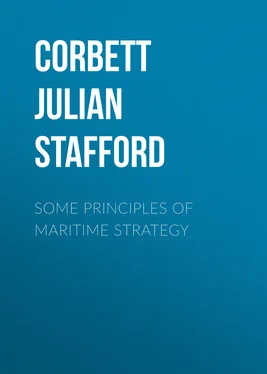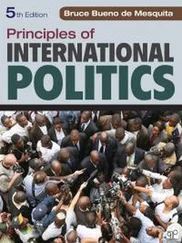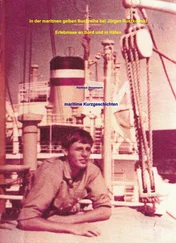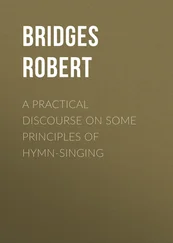Julian Corbett - Some Principles of Maritime Strategy
Здесь есть возможность читать онлайн «Julian Corbett - Some Principles of Maritime Strategy» — ознакомительный отрывок электронной книги совершенно бесплатно, а после прочтения отрывка купить полную версию. В некоторых случаях можно слушать аудио, скачать через торрент в формате fb2 и присутствует краткое содержание. Жанр: military_special, Прочая научная литература, История, foreign_edu, на английском языке. Описание произведения, (предисловие) а так же отзывы посетителей доступны на портале библиотеки ЛибКат.
- Название:Some Principles of Maritime Strategy
- Автор:
- Жанр:
- Год:неизвестен
- ISBN:нет данных
- Рейтинг книги:5 / 5. Голосов: 1
-
Избранное:Добавить в избранное
- Отзывы:
-
Ваша оценка:
- 100
- 1
- 2
- 3
- 4
- 5
Some Principles of Maritime Strategy: краткое содержание, описание и аннотация
Предлагаем к чтению аннотацию, описание, краткое содержание или предисловие (зависит от того, что написал сам автор книги «Some Principles of Maritime Strategy»). Если вы не нашли необходимую информацию о книге — напишите в комментариях, мы постараемся отыскать её.
Some Principles of Maritime Strategy — читать онлайн ознакомительный отрывок
Ниже представлен текст книги, разбитый по страницам. Система сохранения места последней прочитанной страницы, позволяет с удобством читать онлайн бесплатно книгу «Some Principles of Maritime Strategy», без необходимости каждый раз заново искать на чём Вы остановились. Поставьте закладку, и сможете в любой момент перейти на страницу, на которой закончили чтение.
Интервал:
Закладка:
He saw that there was one class of war where the political object was of so vital an importance to both belligerents that they would tend to fight to the utmost limit of their endurance to secure it. But there was another class where the object was of less importance, that is to say, where its value to one or both the belligerents was not so great as to be worth unlimited sacrifices of blood and treasure. It was these two kinds of war he designated provisionally "Unlimited" and "Limited," by which he meant not that you were not to exert the force employed with all the vigour you could develop, but that there might be a limit beyond which it would be bad policy to spend that vigour, a point at which, long before your force was exhausted or even fully developed, it would be wiser to abandon your object rather than to spend more upon it.
This distinction it is very necessary to grasp quite clearly, for it is often superficially confused with the distinction already referred to, which Clausewitz drew in the earlier part of his work—that is, the distinction between what he called the character of modern war and the character of the wars which preceded the Napoleonic era. It will be remembered he insisted that the wars of his own time had been wars between armed nations with a tendency to throw the whole weight of the nation into the fighting line, whereas in the seventeenth and eighteenth centuries wars were waged by standing armies and not by the whole nation in arms. The distinction of course is real and of far-reaching consequences, but it has no relation to the distinction between "Limited" and "Unlimited" war. War may be waged on the Napoleonic system either for a limited or an unlimited object.
A modern instance will serve to clear the field. The recent Russo-Japanese War was fought for a limited object—the assertion of certain claims over territory which formed no part of the possessions of either belligerent. Hostilities were conducted on entirely modern lines by two armed nations and not by standing armies alone. But in the case of one belligerent her interest in the object was so limited as to cause her to abandon it long before her whole force as an armed nation was exhausted or even put forth. The expense of life and treasure which the struggle was involving was beyond what the object was worth.
This second distinction—that is, between Limited and Unlimited wars—Clausewitz regarded as of greater importance than his previous one founded on the negative or positive nature of the object. He was long in reaching it. His great work On War as he left it proceeds almost entirely on the conception of offensive or defensive as applied to the Napoleonic ideal of absolute war. The new idea came to him towards the end in the full maturity of his prolonged study, and it came to him in endeavouring to apply his strategical speculations to the practical process of framing a war plan in anticipation of a threatened breach with France. It was only in his final section On War Plans that he began to deal with it. By that time he had grasped the first practical result to which his theory led. He saw that the distinction between Limited and Unlimited war connoted a cardinal distinction in the methods of waging it. When the object was unlimited, and would consequently call forth your enemy's whole war power, it was evident that no firm decision of the struggle could be reached till his war power was entirely crushed. Unless you had a reasonable hope of being able to do this it was bad policy to seek your end by force—that is, you ought not to go to war. In the case of a limited object, however, the complete destruction of the enemy's armed force was beyond what was necessary. Clearly you could achieve your end if you could seize the object, and by availing yourself of the elements of strength inherent in the defensive could set up such a situation that it would cost the enemy more to turn you out than the object was worth to him.
Here then was a wide difference in the fundamental postulate of your war plan. In the case of an unlimited war your main strategical offensive must be directed against the armed forces of the enemy; in the case of a limited war, even where its object was positive, it need not be. If conditions were favourable, it would suffice to make the object itself the objective of your main strategical offensive. Clearly, then, he had reached a theoretical distinction which modified his whole conception of strategy. No longer is there logically but one kind of war, the Absolute, and no longer is there but one legitimate objective, the enemy's armed forces. Being sound theory, it of course had an immediate practical value, for obviously it was a distinction from which the actual work of framing a war plan must take its departure.
A curious corroboration of the soundness of these views is that Jomini reached an almost identical standpoint independently and by an entirely different road. His method was severely concrete, based on the comparison of observed facts, but it brought him as surely as the abstract method of his rival to the conclusion that there were two distinct classes of object. "They are of two different kinds," he says, "one which may be called territorial or geographical … the other on the contrary consists exclusively in the destruction or disorganisation of the enemy's forces without concerning yourself with geographical points of any kind." It is under the first category of his first main classification "Of offensive wars to assert rights," that he deals with what Clausewitz would call "Limited Wars." Citing as an example Frederick the Great's war for the conquest of Silesia, he says, "In such a war … the offensive operations ought to be proportional to the end in view. The first move is naturally to occupy the provinces claimed" (not, be it noted, to direct your blow at the enemy's main force). "Afterwards," he proceeds, "you can push the offensive according to circumstances and your relative strength in order to obtain the desired cession by menacing the enemy at home." Here we have Clausewitz's whole doctrine of "Limited War"; firstly, the primary or territorial stage, in which you endeavour to occupy the geographical object, and then the secondary or coercive stage, in which you seek by exerting general pressure upon your enemy to force him to accept the adverse situation you have set up.
Such a method of making war obviously differs in a fundamental manner from that which Napoleon habitually adopted, and yet we have it presented by Jomini and Clausewitz, the two apostles of the Napoleonic method. The explanation is, of course, that both of them had seen too much not to know that Napoleon's method was only applicable when you could command a real physical or moral preponderance. Given such a preponderance, both were staunch for the use of extreme means in Napoleon's manner. It is not as something better than the higher road that they commend the lower one, but being veteran staff-officers and not mere theorists, they knew well that a belligerent must sometimes find the higher road beyond his strength, or beyond the effort which the spirit of the nation is prepared to make for the end in view, and like the practical men they were, they set themselves to study the potentialities of the lower road should hard necessity force them to travel it. They found that these potentialities in certain circumstances were great. As an example of a case where the lower form was more appropriate Jomini cites Napoleon's campaign against Russia in 1812. In his opinion it would have been better if Napoleon had been satisfied to begin on the lower method with a limited territorial object, and he attributes his failure to the abuse of a method which, however well suited to his wars in Germany, was incapable of achieving success in the conditions presented by a war with Russia.
Seeing how high was Napoleon's opinion of Jomini as a master of the science of war, it is curious how his views on the two natures of wars have been ignored in the present day. It is even more curious in the case of Clausewitz, since we know that in the plenitude of his powers he came to regard this classification as the master-key of the subject. The explanation is that the distinction is not very clearly formulated in his first seven books, which alone he left in anything like a finished condition. It was not till he came to write his eighth book On War Plans that he saw the vital importance of the distinction round which he had been hovering. In that book the distinction is clearly laid down, but the book unhappily was never completed. With his manuscript, however, he left a "Note" warning us against regarding his earlier books as a full presentation of his developed ideas. From the note it is also evident that he thought the classification on which he had lighted was of the utmost importance, that he believed it would clear up all the difficulties which he had encountered in his earlier books—difficulties which he had come to see arose from a too exclusive consideration of the Napoleonic method of conducting war. "I look upon the first six books," he wrote in 1827, "as only a mass of material which is still in a manner without form and which has still to be revised again. In this revision the two kinds of wars will be kept more distinctly in view all through, and thereby all ideas will gain in clearness, in precision, and in exactness of application." Evidently he had grown dissatisfied with the theory of Absolute War on which he had started. His new discovery had convinced him that that theory would not serve as a standard for all natures of wars. "Shall we," he asks in his final book, "shall we now rest satisfied with this idea and by it judge of all wars, however much they may differ?" 2 2 Clausewitz, On War, Book viii, chap, ii
He answers his question in the negative. "You cannot determine the requirements of all wars from the Napoleonic type. Keep that type and its absolute method before you to use when you can or when you must , but keep equally before you that there are two main natures of war."
Интервал:
Закладка:
Похожие книги на «Some Principles of Maritime Strategy»
Представляем Вашему вниманию похожие книги на «Some Principles of Maritime Strategy» списком для выбора. Мы отобрали схожую по названию и смыслу литературу в надежде предоставить читателям больше вариантов отыскать новые, интересные, ещё непрочитанные произведения.
Обсуждение, отзывы о книге «Some Principles of Maritime Strategy» и просто собственные мнения читателей. Оставьте ваши комментарии, напишите, что Вы думаете о произведении, его смысле или главных героях. Укажите что конкретно понравилось, а что нет, и почему Вы так считаете.












